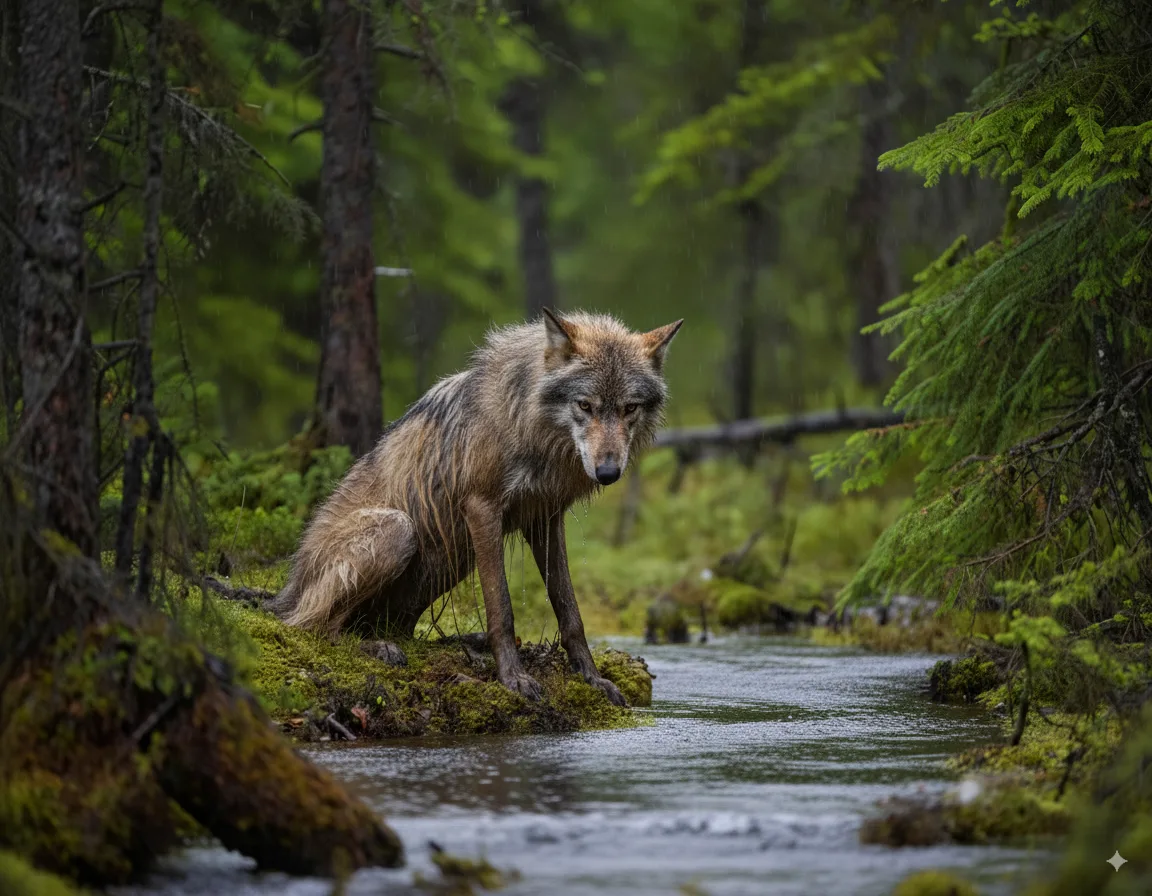The wolf had not moved for three days. It stood rigid by the riverbank, fur matted from rain, eyes fixed on the earth beneath its paws. Villagers skirted the path, whispering of sickness or curses. Yet Dr. Adrian Cole, local veterinarian, couldn’t look away.
He had seen wild animals before, injured and cornered, but never this—an apex predator refusing food, ignoring prey, even ignoring humans. Something tethered it there, silent and invisible. At night, faint cries drifted with the river’s current, and Adrian’s pulse quickened each time he strained to hear them.
By the next morning, the wolf’s ribs pressed through its hide. Still, it would not leave. Adrian knew he was running out of time to act—whether for the beast or for whatever secret lay buried beneath its vigil. He remembered the first day he saw it…
Three days earlier, Adrian had taken to crossing the forest path on his way home from the small animal hospital where he worked. It was quicker than the main road, saving twenty minutes from his commute, though the locals warned against it after dusk. He trusted his instincts more than superstition.
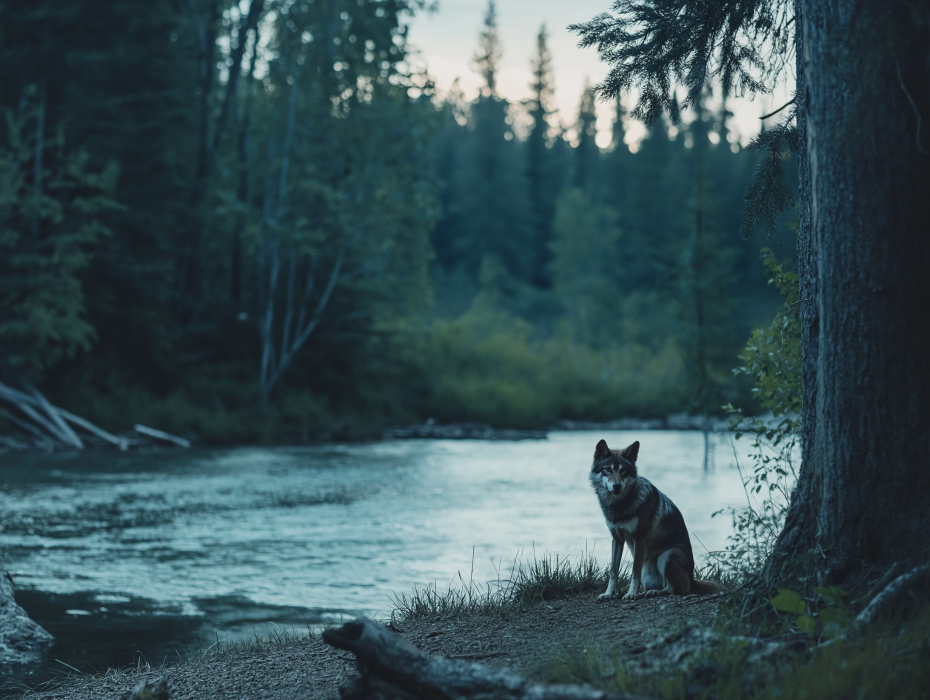
On that first evening, the sun was just rising, turning the river’s surface copper. That was when he noticed the silhouette. A lone wolf, still as stone, gazing at the bank as though waiting for something to surface. Adrian slowed, unsettled, but told himself it was only hunting.
The wolf did not stir even when Adrian’s boots cracked twigs nearby. Its ears twitched, but the rest of its body remained unnervingly fixed. He kept walking, convincing himself not to interfere. Yet a prickling unease lingered, sharp enough to follow him all the way home.
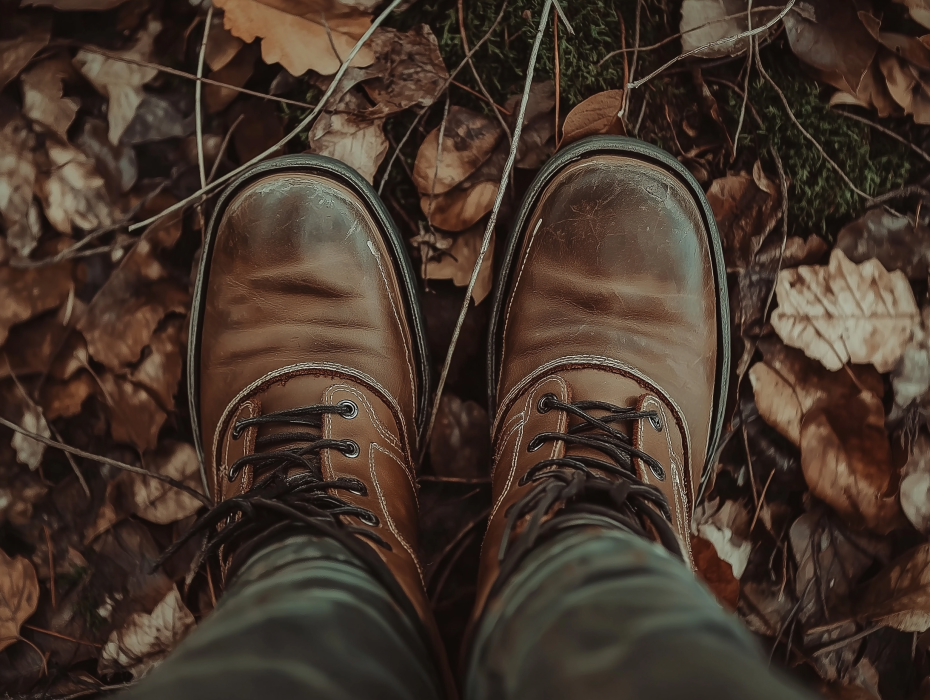
Later the same day, duty drew him back along the same path. He had been called to a farmhouse that bordered the forest. It was an injured dog with a leg mangled in barbed wire. The route through the woods was the fastest, and he carried his kit slung over one shoulder.
To his astonishment, the wolf stood in the same spot as before, posture unchanged. No kill lay at its feet, and there were no signs of feeding. Adrian’s pulse quickened. Predators didn’t loiter without reason. He felt the air tighten as he passed, the wolf’s eyes flicking toward him only briefly.

That night, long after he had stitched up the farm dog and washed his hands raw, he found his thoughts circling back. A wolf anchored in place, ignoring prey and people alike—it was wrong. It felt too wrong to dismiss as a coincidence. Against his better judgment, he resolved to look again.
By the second encounter, curiosity had sharpened into unease. The wolf’s ribs showed more clearly now, and its muzzle was wet from the river but free of blood. It was starving. Yet it refused to leave. Whatever bound it there was stronger than hunger, and Adrian meant to uncover why.
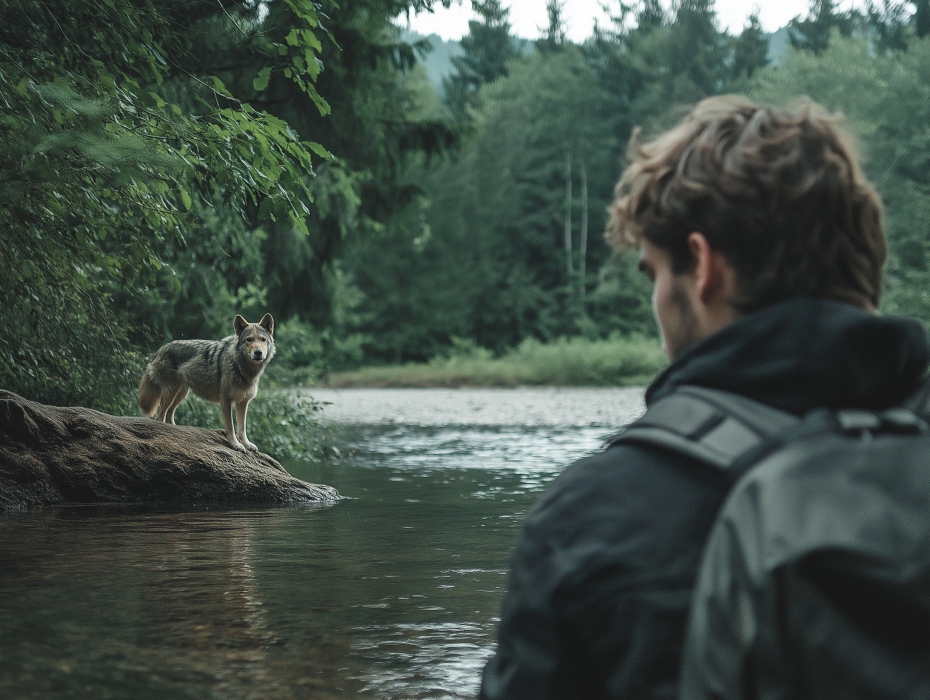
The forest was quieter as he passed, as though the other creatures had learned to skirt the riverbank. Even birdsong fell short near the wolf. Adrian noticed the silence, the way sound seemed to falter around that patch of earth, as though nature itself held its breath.
He began walking slower, lingering within sight of the animal. It didn’t advance nor retreat. Its amber eyes seemed to measure him, with cold calculation rather than aggression. Adrian felt himself weighed and dismissed, as though he were irrelevant to whatever vigil kept the beast rooted.
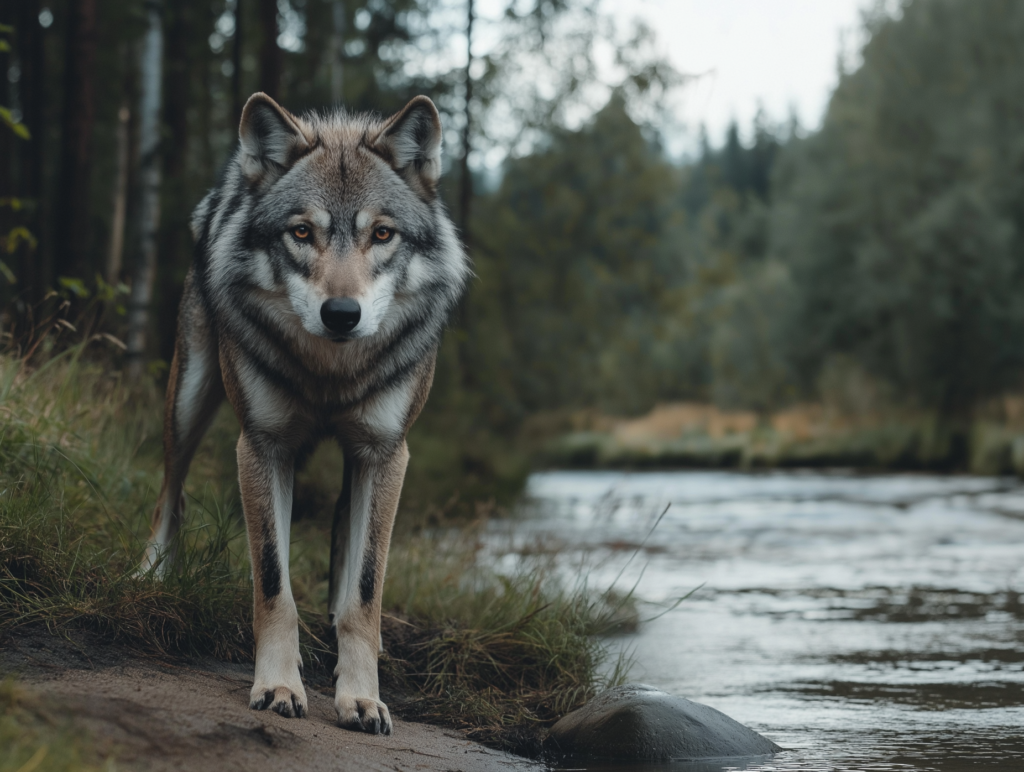
Curiosity pushed him closer. He stopped at the edge of the river, water lapping against the stones. The wolf’s gaze snapped to him instantly, shoulders tensing. Adrian froze, heartbeat pounding in his throat. The animal’s jaws parted slightly, teeth flashing white in the fading light.
He forced himself to hold still, unwilling to spook it into violence. For a moment, predator and man stood locked in a silent standoff. Then, as if satisfied, the wolf turned its head back toward the ground. Adrian exhaled slowly, aware he had been granted a reprieve.
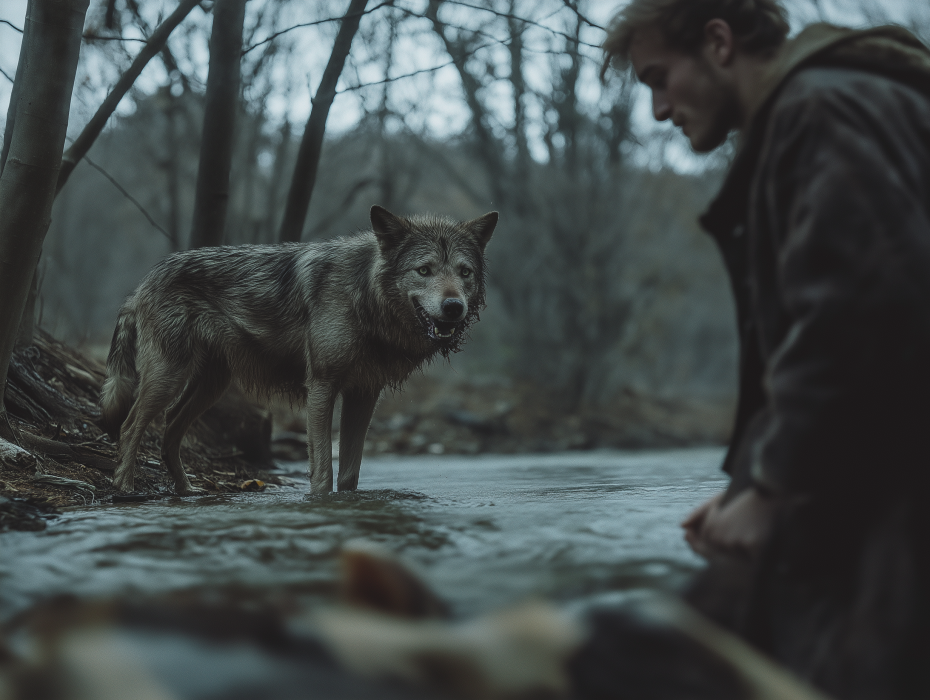
Later, heavy rain turned the river into a churning sheet of brown water. Adrian half-expected the wolf to vanish, driven by instinct to seek shelter. Yet it remained, fur plastered to its body, unmoved even as the water licked higher against the stones beneath its paws.
This time, Adrian was carrying field notes, jotting down details between his hospital calls. “Day two: still in position. No feeding behavior observed. Appears weak. Eyes fixed downward.” His colleagues teased him for indulging in a personal project, but they didn’t understand that this was behavior that defied explanation.
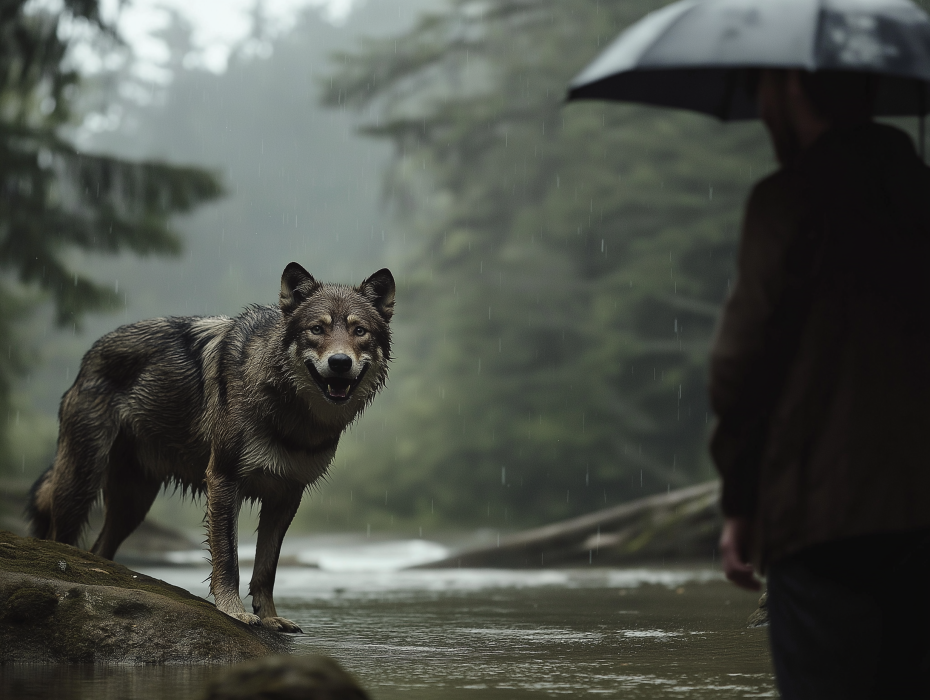
He paused again, umbrella dripping, and whispered under his breath, “Why won’t you move?” The wolf didn’t answer, of course, but its ears flicked at his voice. It had heard him. A shiver ran down Adrian’s spine at the thought that it might understand.
He returned as often as he could, carrying small offerings—strips of jerky and scraps from the hospital. He set them on the opposite bank, far enough to show respect. The wolf’s head never turned. The meat rotted in the rain, ignored, until crows claimed it. It wasn’t hunger alone that was driving this vigil.
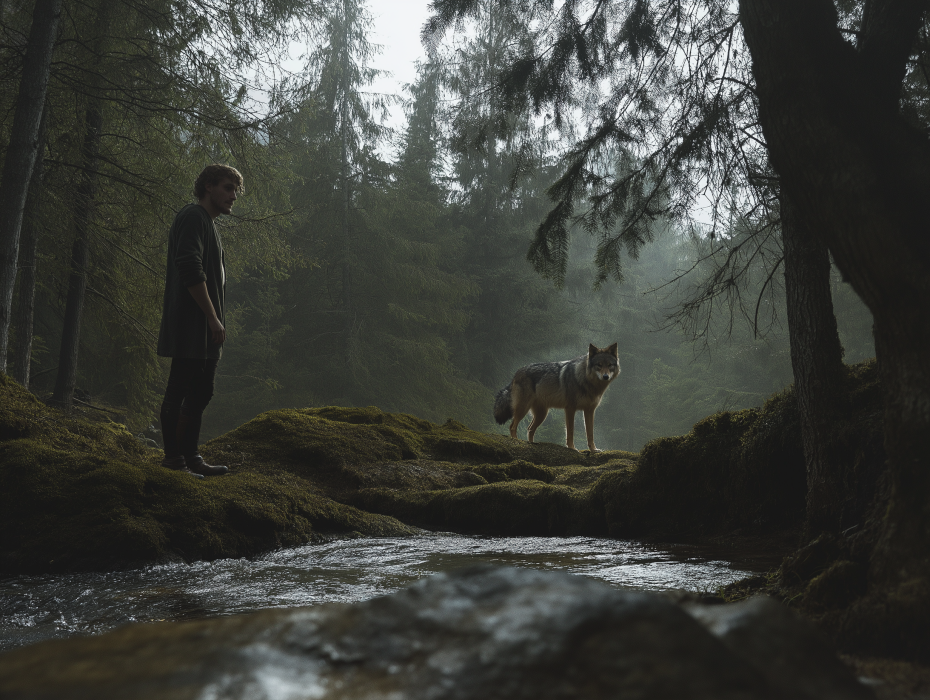
Adrian’s unease hardened into determination. Something rooted the animal to that exact spot, stronger than instinct, stronger than survival. And until he uncovered what it was, he knew the mystery would gnaw at him. Yet the closer he came, the greater was the risk of provoking a predator into fury.
The next time, Adrian stopped a good twenty paces from the wolf. He bent, selected a pebble, and tossed it lightly so it landed with a plunk in the water. The wolf’s ears twitched, but its body remained eerily still, as though carved from stone.
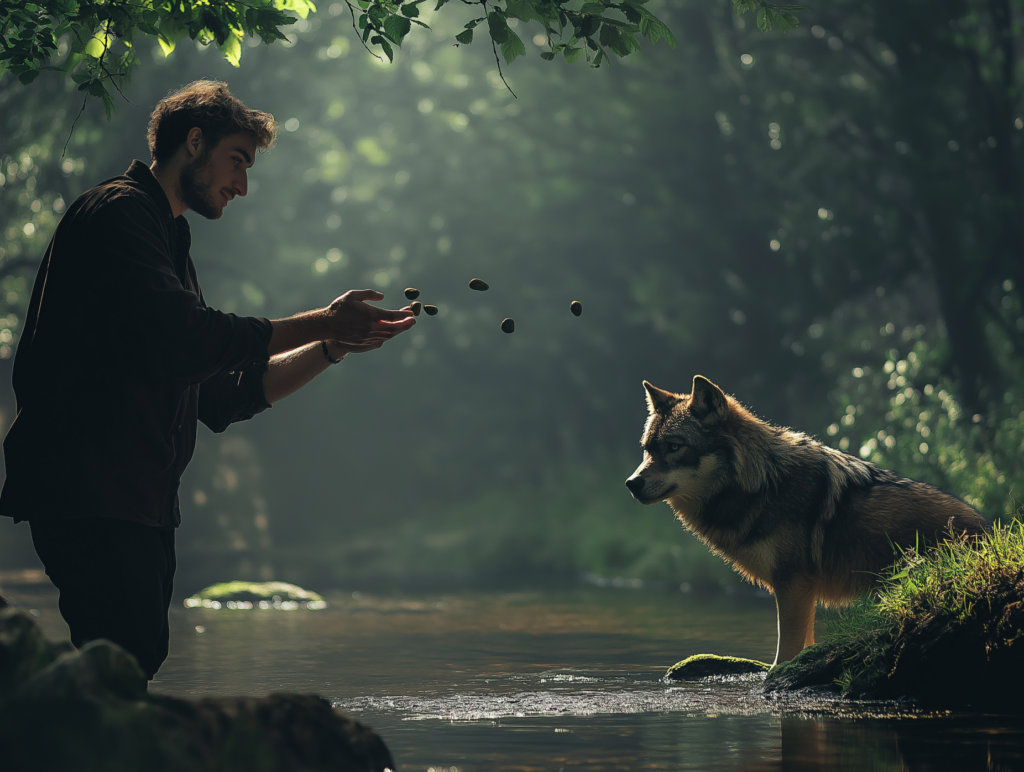
He tried again, this time flicking a larger rock toward the riverbank. It skittered across the stones, coming to rest barely two feet from the animal. A low rumble escaped the wolf’s chest, deep and guttural, vibrating through the ground. Adrian froze, pulse hammering. Still, the beast didn’t lunge.
His curiosity outweighed fear. He edged sideways, tracing a slow arc as though to skirt the creature entirely. The wolf’s head followed his movement, eyes locked. Muscles quivered beneath its sodden fur, but its paws never shifted from the earth. It was guarding something, yet refusing to chase him off.
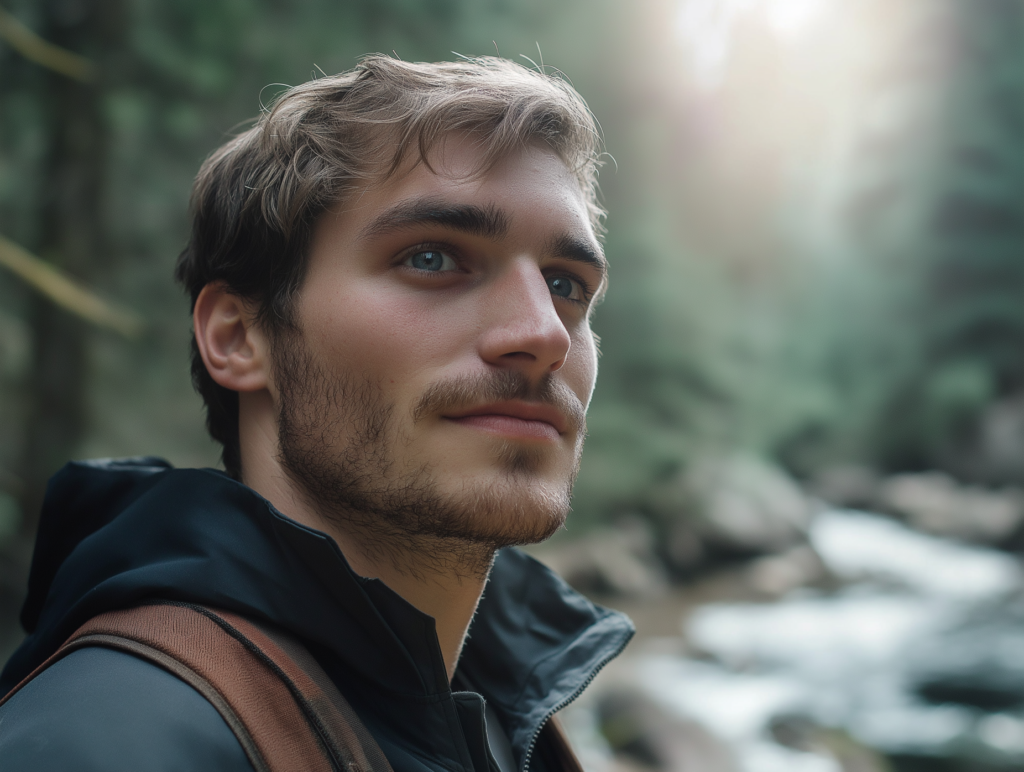
Halfway around the arc, Adrian stopped to listen. The forest was silent except for the water’s hiss. Then—faint, fleeting—he thought he heard it. A sound beneath the river’s constant murmur, thin and high-pitched. His brow furrowed. Could it have been imagination? The wolf growled, silencing his doubt.
He held his ground, straining to hear again. The wolf’s stare bored into him, amber eyes burning with a strange intensity. Then the sound returned, softer than before—like a whimper carried on the current. Adrian’s chest tightened. He stepped closer, only for the wolf to snarl and bare its teeth.
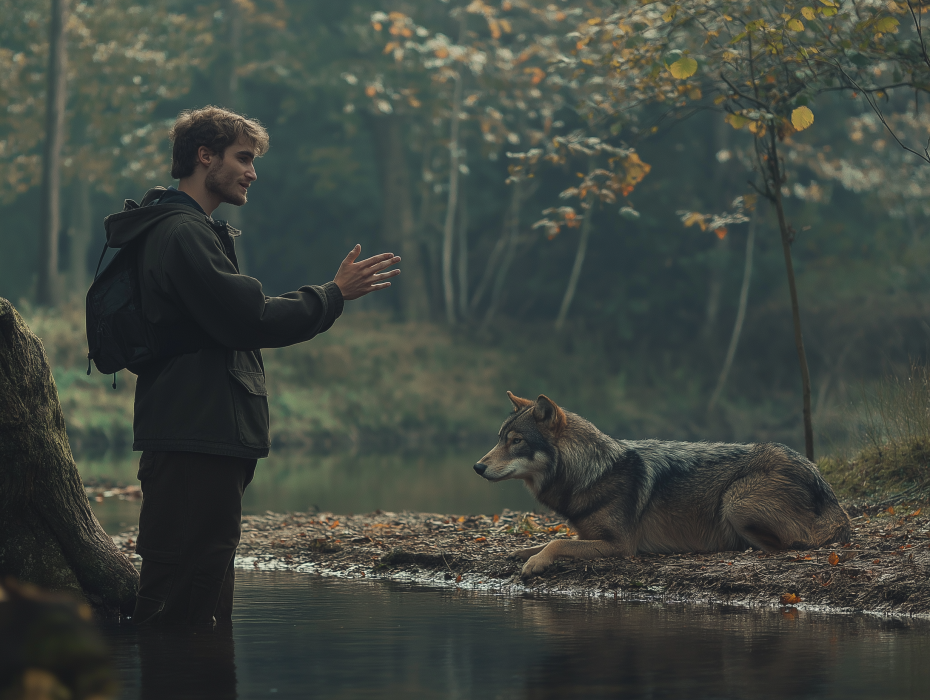
Adrian retreated instantly, hands raised, showing submission. The wolf’s growl subsided, but it did not relax. Its gaze flicked back toward the ground, then toward him again. The warning said, “Enough!” Whatever secret lingered beneath its paws, it would not allow him to uncover it so easily.
Later, he replayed the sound in his mind. He told himself it might have been the creak of waterlogged wood, or the squeal of a bird hidden in reeds. Yet the echo lingered. He knew the difference between an illusion and a cry. This had been real.
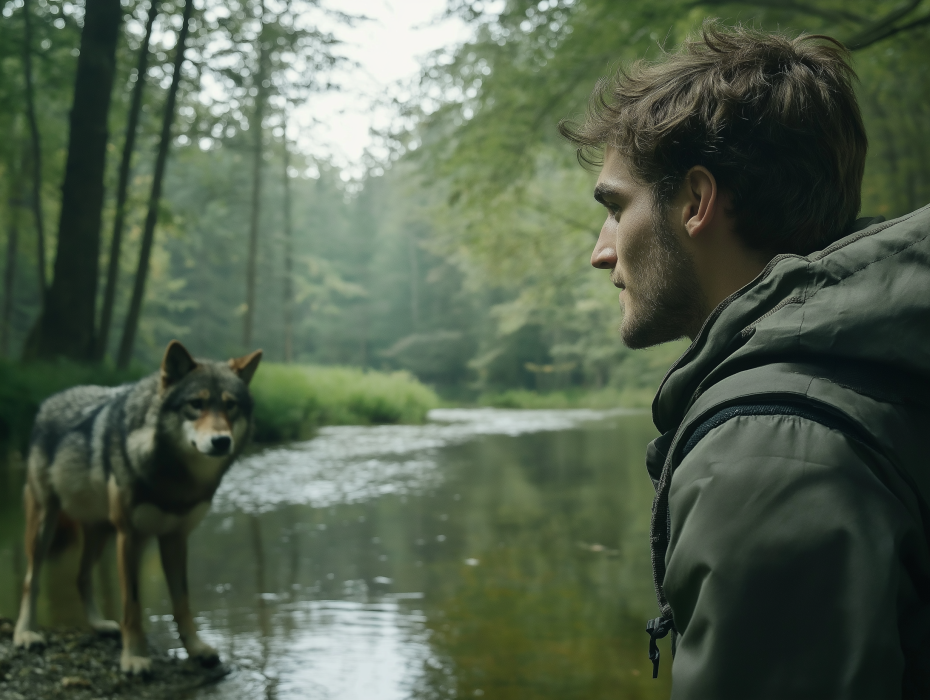
Adrian tried a new tactic. Instead of approaching directly, he kept his distance, circling wide, keeping trees between them. The wolf shifted its head with each of his steps, tracking him. But it never abandoned its station. The invisible tether held.
Through the trees, Adrian found a new angle. The wolf looked frailer, fur dull, flanks sunken. Yet its posture remained iron-strong. Adrian crouched low, listening. For a moment, nothing. Then again—the faintest murmur, like life buried beneath the soil. He pressed his ear closer to the ground.
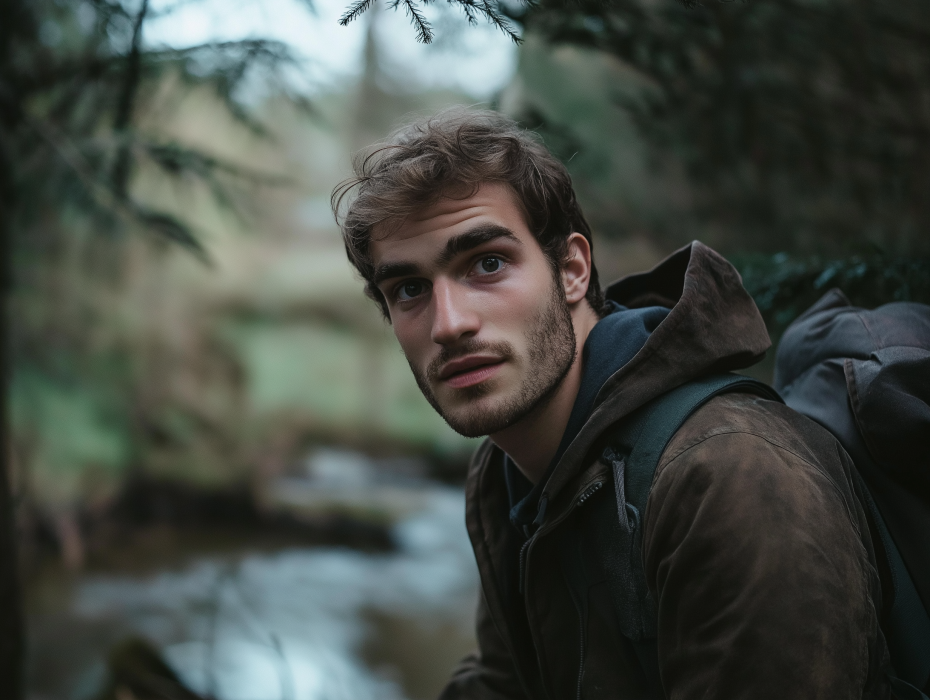
Before the sound could sharpen, a crack of wood snapped behind him. Adrian spun, heart in his throat. Just a falling branch, crashing into undergrowth. But when he turned back, the wolf was glaring at him with a ferocity so raw he stumbled backward. His intrusion had been noticed.
Sleep came poorly that night. Dreams carried the wolf into his room, silent and watchful, its gaze boring into him from the corner. He woke in a sweat, unsettled. Never before had an animal intruded so heavily upon his mind. Its persistence felt less natural with each passing day.

The unease gnawed at him until he brought it up at the hospital. Over coffee, he mentioned the wolf to a fellow vet. She frowned, shaking her head. “Over two days? That doesn’t happen. Territory shifts, hunting demands—they move. If it hasn’t, something’s very wrong.”
When he added that it was closer to three days now, her expression hardened. “Stay away. Sick animals can be unpredictable. You’d know that better than anyone.” Adrian nodded, but inside, the warning only deepened his conviction. Nature didn’t waste energy without cause. Something bound that wolf in place.
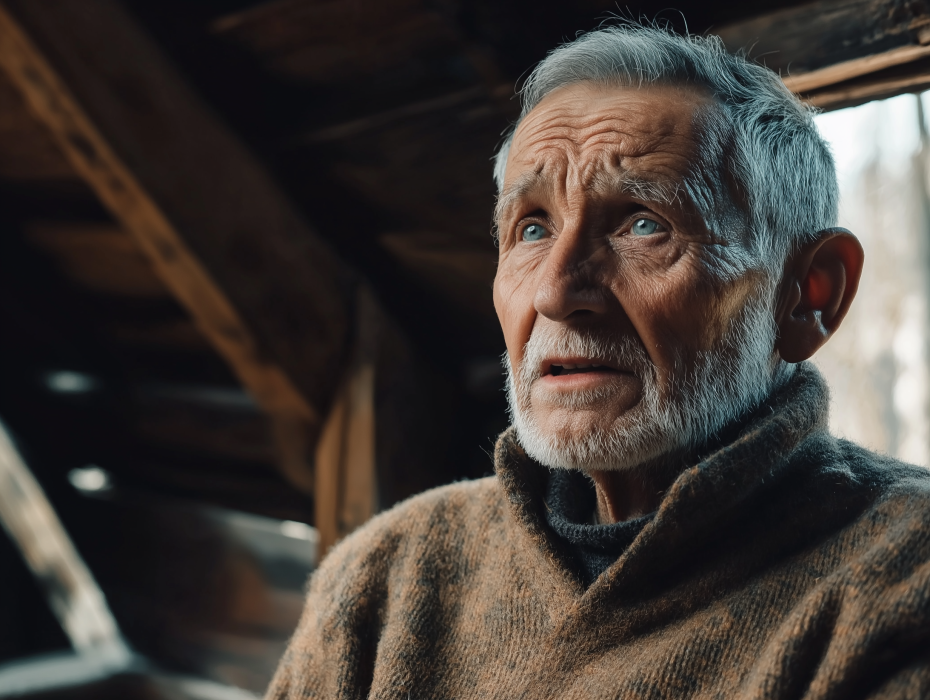
That same day, he stopped at a forester’s cabin on the forest’s edge. The old man listened silently, his weathered face unreadable. When Adrian finished, the forester spat into the fire and muttered, “Bad sign. Wolves that linger bring death. Best leave it to its curse.”
Adrian bristled. He had little patience for superstition, but the forester’s eyes carried a weight of genuine fear. “What if it’s injured?” Adrian pressed. The man shook his head. “Injured wolves hide. Their instinct is to heal or die. They don’t stand guard.” He refused to speak further.
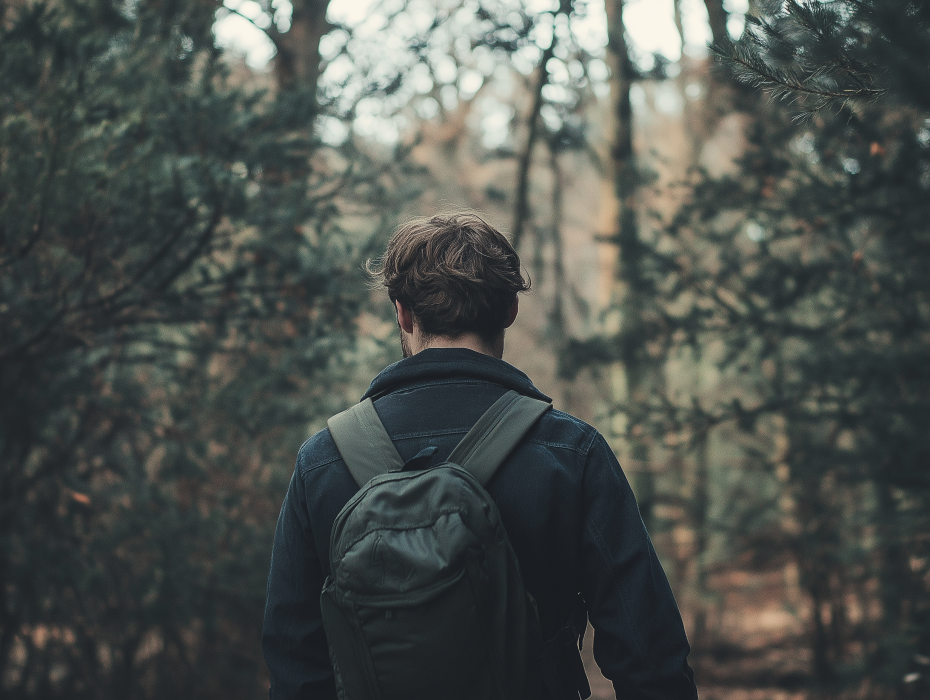
As Adrian walked back, the forest felt altered. Every shadow seemed thicker, every rustle in the undergrowth too sharp. His rational mind whispered explanations like injury, instinct, and territorial drive. But none matched what he had seen. The wolf wasn’t surviving. For lack of a better word, it seemed to be “sacrificing” itself.
Whispers were already filling the village pub. Farmers swore they’d heard eerie cries echoing from the river during storms. A child claimed to have seen glowing eyes watching from the bank. Adrian listened from the corner, knowing exaggeration painted their fears, but kernels of truth glimmered within.
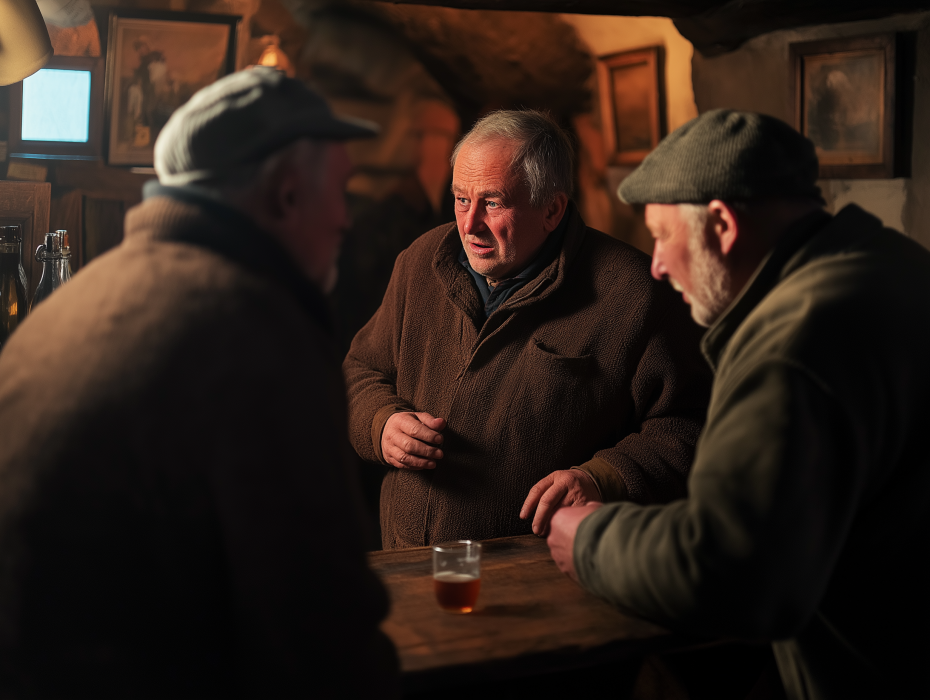
Something else chilled Adrian’s blood when he heard it. A group of farmers muttered that they would shoot the animal to keep their sheep safe from harm. Just a protective measure, they claimed. If he did not intervene, he knew something terrible would befall.
He considered reporting it to wildlife authorities, but doubt held him back. Bureaucracy moved slowly, and he feared they’d simply put a bullet in the animal to “resolve the risk.” The thought of that amber gaze extinguished without understanding its guardianship twisted his stomach.
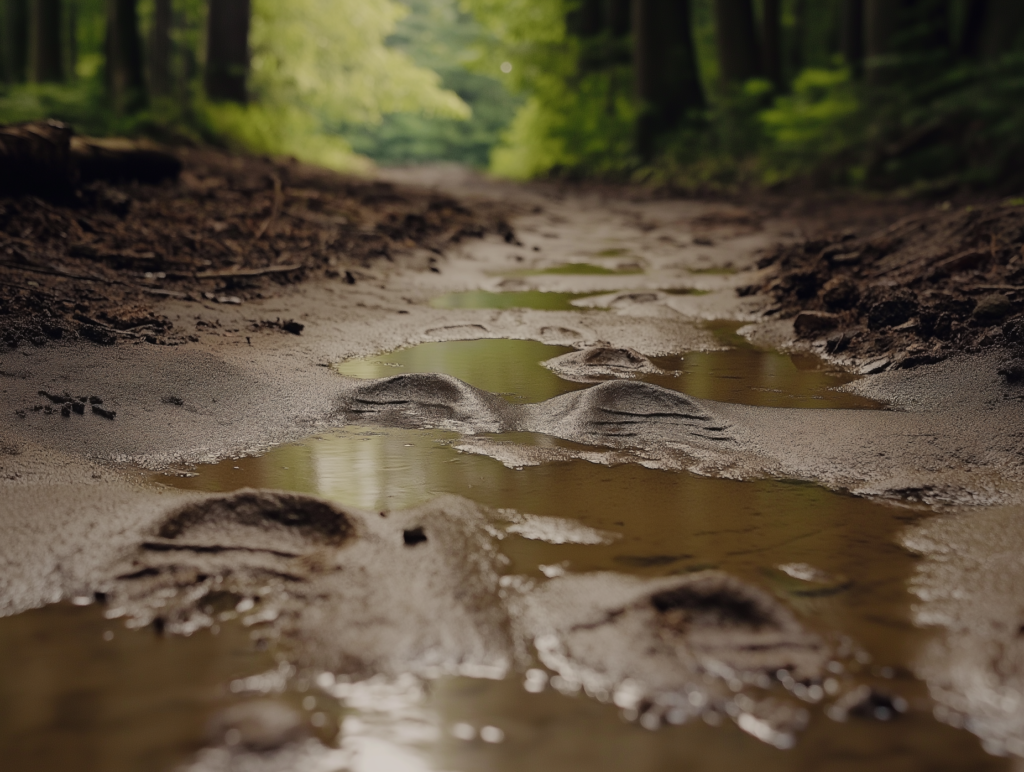
As he crossed the river path, he noticed footprints in the mud. These were human, not animal. Someone else had been there recently, circling near the wolf. Adrian’s chest tightened. Curiosity wasn’t his burden alone. Had the farmers already interfered? That could mean bloodshed!
He scanned the riverbank, half-expecting to see hunters with rifles. But the forest was empty save for the wolf, still unwavering in its post. Its fur bristled faintly as his gaze swept over it, as though it too sensed the intrusion of others.
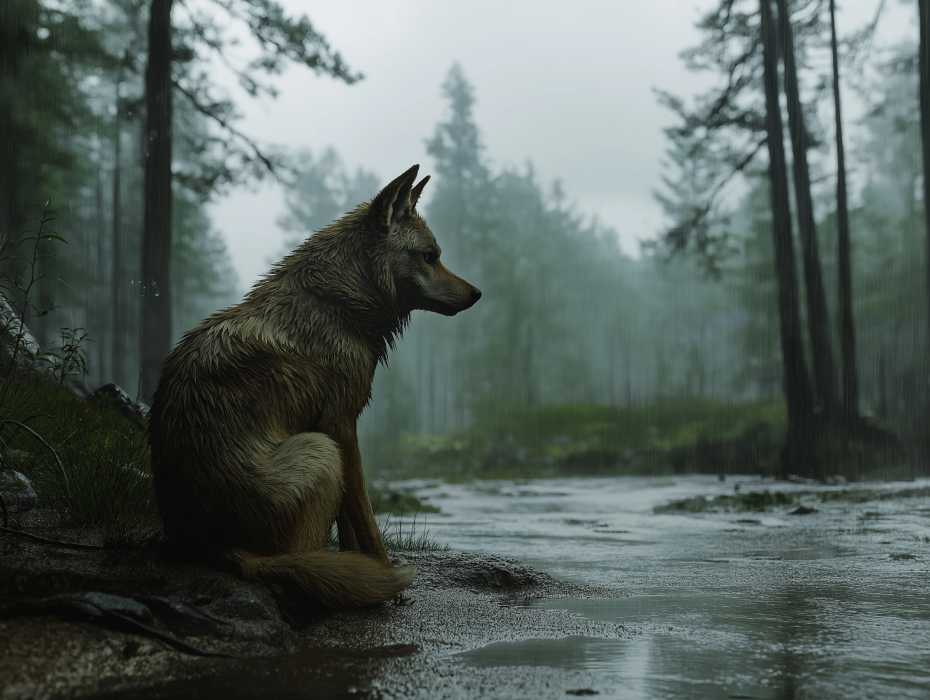
The storm came that night. Rain hammered the rooftops, and thunder rattled windowpanes. Adrian lay awake, thinking of the riverbank. If water levels rose, whatever kept the wolf rooted there would be at risk. The thought pressed on him with the weight of inevitability.
At dawn, he pulled on boots and took the forest path again. Mud clung to his steps, the river swollen and frothing. The wolf was still there, half-drenched, fur heavy with water. It swayed faintly on its legs but didn’t abandon its ground. Its endurance bordered on madness.
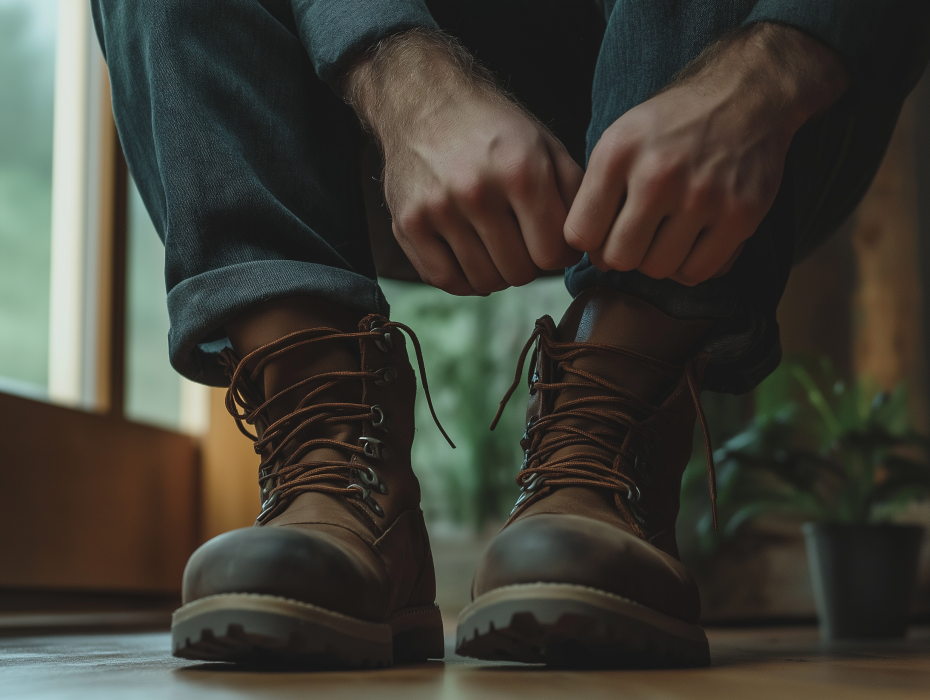
Adrian approached more closely than before, counting each step. Ten paces. Eight. The wolf’s ears twitched, lips curling back. Adrian stopped, heart pounding. He crouched, as if to show deference. For a breathless moment, the animal held his gaze, then turned its head back toward the earth.
That tiny concession emboldened him. He leaned closer, listening. At first, he heard only the roar of water. Then there was a sharper sound like claws scrabbling faintly against stone. His throat tightened. He inched forward until the wolf’s snarl split the air, a warning as primal as thunder itself.
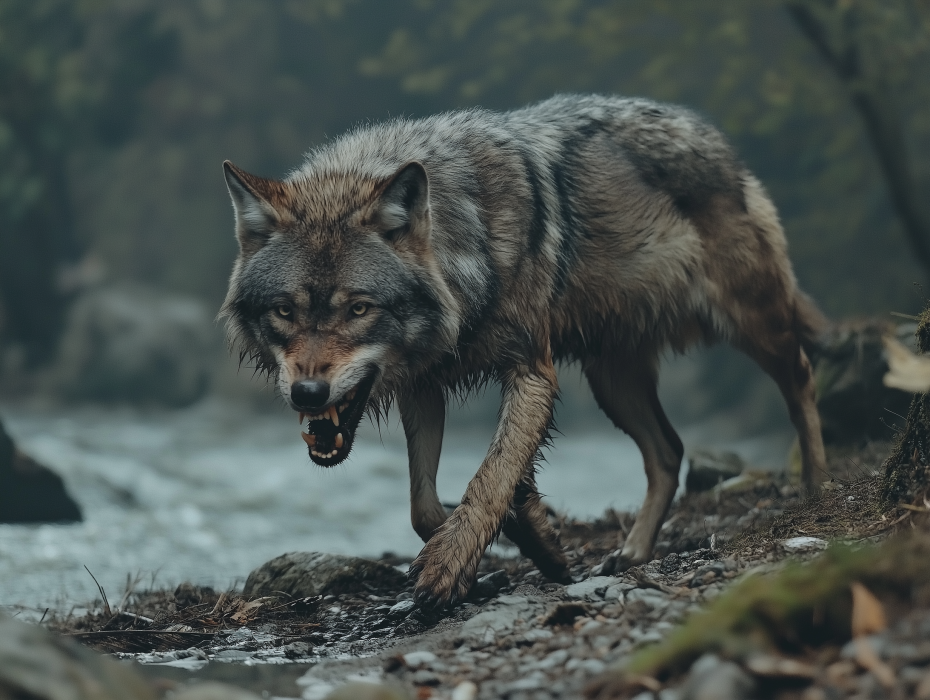
Adrian froze, hands lifted. “Easy,” he whispered, though his voice barely carried over the river. The wolf’s growl rumbled deep, vibrating through his chest. Slowly, he backed away until the tension broke. The beast lowered its muzzle, but its eyes followed him with raw suspicion.
He retreated across the river, soaked and shaken. But the sounds lingered in his head—scraping, faint cries, unmistakably alive. He told himself it could have been an illusion born of water and fear. Yet his gut refused the comfort of doubt. Something lived beneath that vigil.
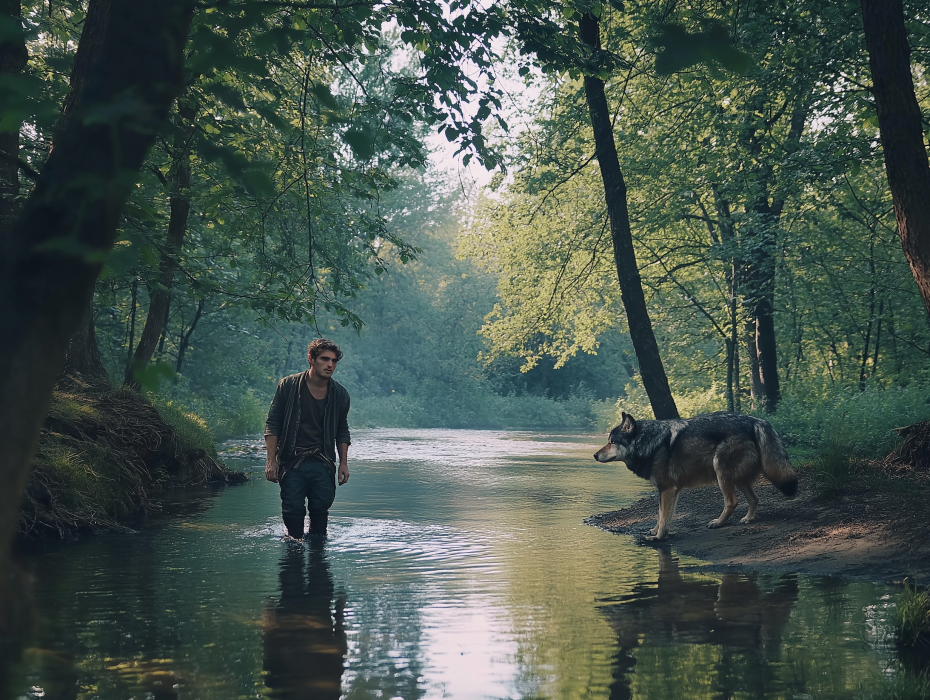
A little later in the day, the storm eased, but debris—fallen branches, swollen earth littered the forest. The river ran darker, swollen with silt. The wolf stood thinner than ever, its chest heaving with each breath. Adrian felt the urgency sharpen, a countdown he couldn’t measure but couldn’t ignore either.
Determined, he tried again to circle the wolf, keeping a wider distance this time. From the trees, he lowered to one knee and pressed his ear to the sodden ground. At first, it was silence. Then he heard, faint and desperate, a sound like a whine, muffled, struggling against earth’s weight.
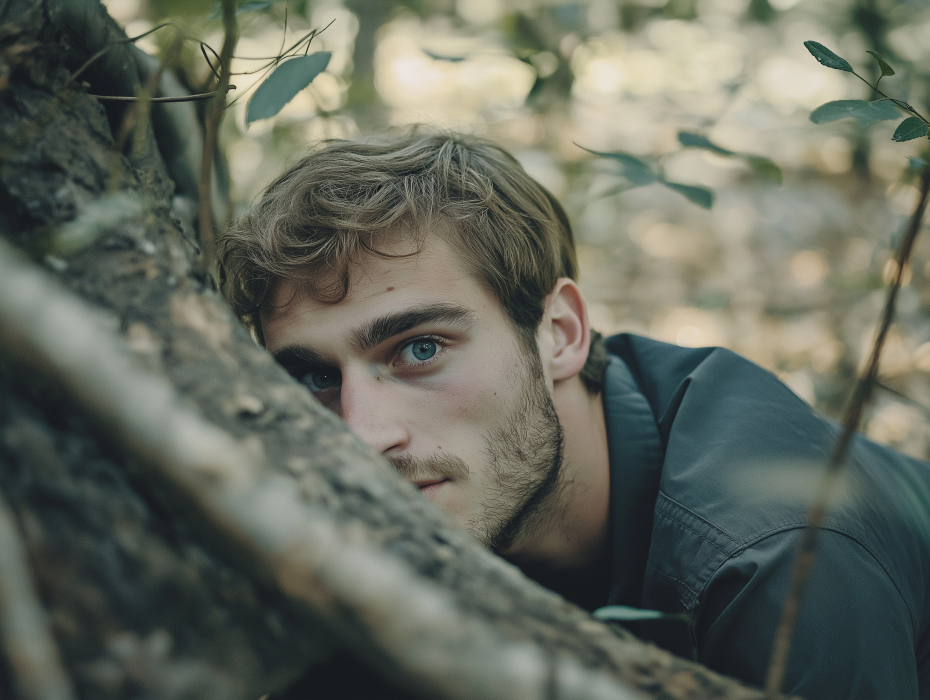
He jolted upright, pulse racing. The wolf had shifted slightly, catching him in its gaze. No growl came this time, only a chilling stillness. Adrian had heard it. There was life buried beneath the surface. Yet approaching again would test the thin tether of trust between man and beast.
His head swam with a single train of thoughts: There’s something alive down there. The wolf knows. It’s waiting for—or daring me to act. He paced up and down, caught between dread and duty. If he delayed too long, it could be too late for the wolf and whatever life it guarded.
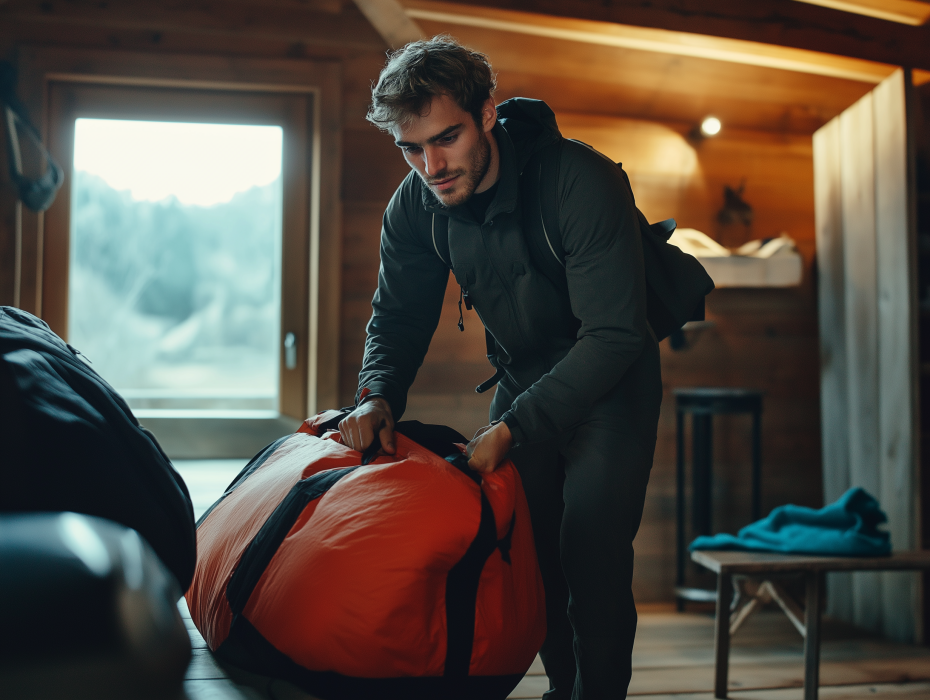
His resolve hardened. He went home quickly to pack gloves, a headlamp, and a small folding spade into his satchel. He told himself it was a precaution, but deep down he knew—he couldn’t stand by anymore.
He sat at his desk momentarily, tracing maps of the river’s bend. He marked where the wolf stood, where the earth sloped into uneven ground. His pen hovered above the page, caught between science and instinct. Each minute wasted meant lives slipping further from reach.

He could hardly recognize himself in the mirror. Dark circles rimmed his eyes, jaw tight with obsession. He knew he was risking not just his safety but his reputation. Colleagues would call him reckless. Yet the wolf’s vigil had transformed into a challenge he couldn’t abandon.
So he returned, tools at hand, resolve hardening with each step through the trees. The wolf lifted its head as he approached, amber eyes burning despite the gaunt frame. Adrian’s breath caught. This was no ordinary confrontation—it was a standoff with something ancient, primal, and unforgiving.
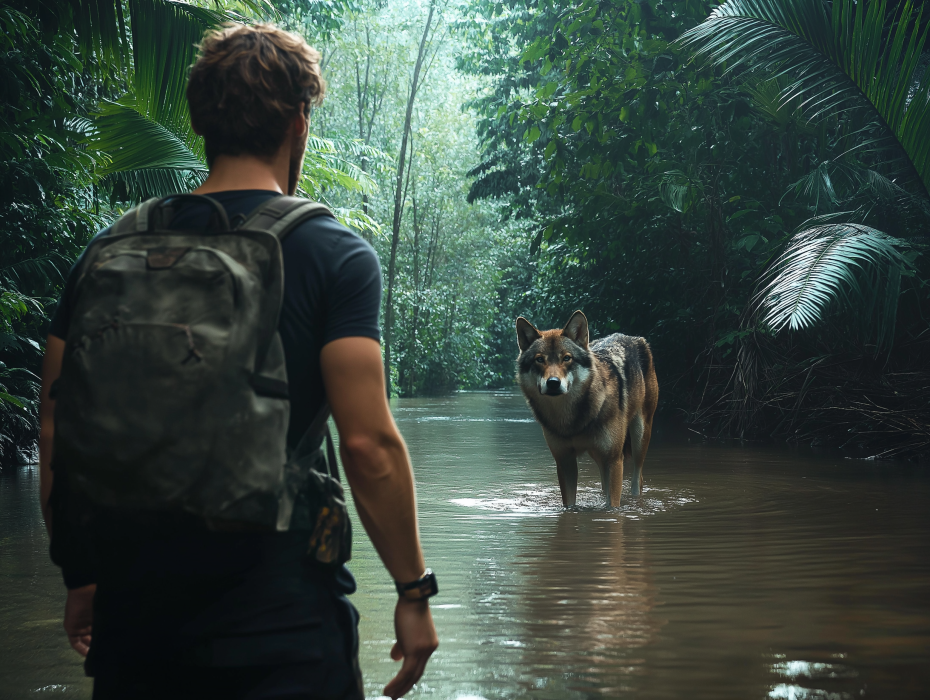
The wolf was gaunt to the point of frailty. Its ribs rose and fell in shallow rhythm, eyes dulled but unwavering. Adrian slowed, the spade’s weight pressing against his back. Every instinct warned him this was folly. Still, he edged closer than ever before.
The growl came low and guttural, rising from the wolf’s chest like a storm building from nothing. Adrian froze, lifting both hands to show he carried no threat. “Easy,” he whispered, heart hammering. The wolf’s teeth flashed, then disappeared as its jaws snapped shut with deliberate restraint.
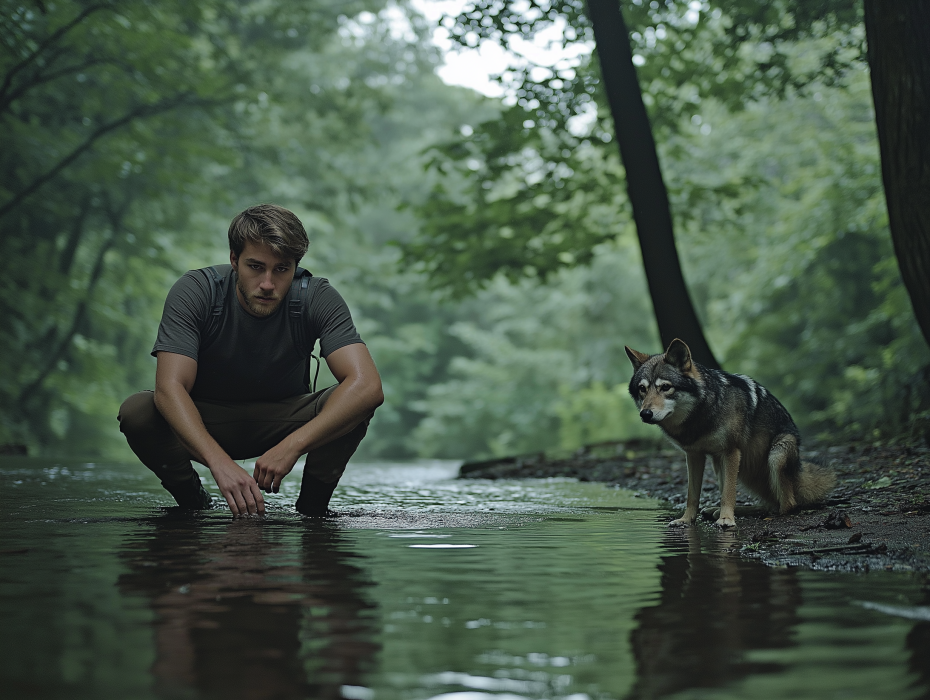
Adrian crouched, lowering himself until the mud soaked his trousers. Slowly, he set the spade down beside him, letting the wolf see the gesture. The animal’s gaze never wavered, its ears twitching in quick flickers. It was letting him stay—for now. He dared not test the fragile permission.
Leaning closer to the riverbank, he pressed an ear to the ground again. The sound was weaker this time, fragile and broken, but there. It was life, whimpering from beneath the stones. His chest constricted. He turned his face toward the wolf, whispering, “There’s something down there, isn’t there?”
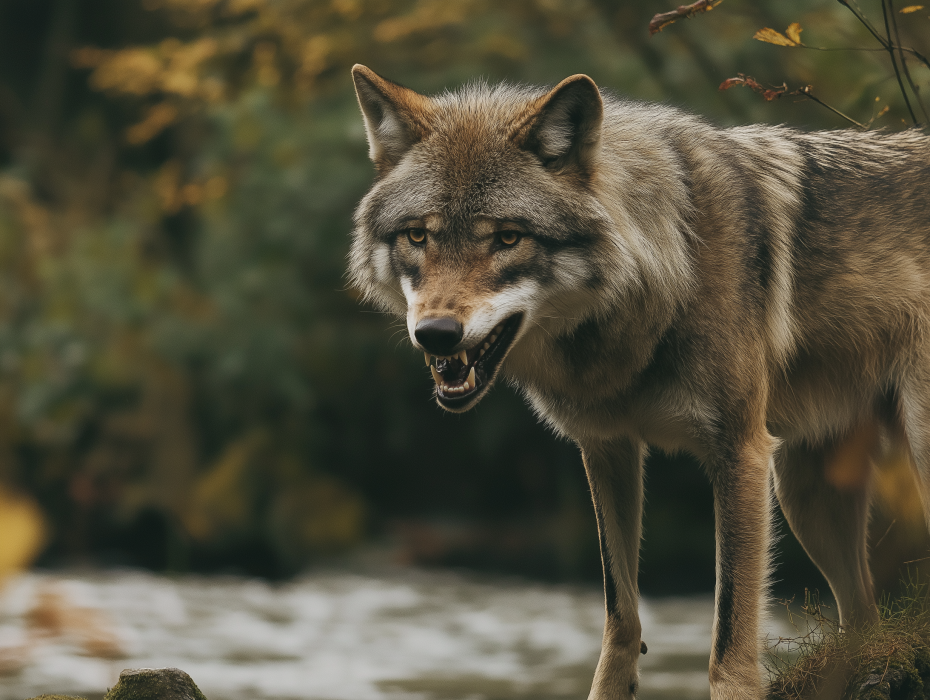
The wolf’s body tensed, shoulders rising like a coiled rope. Adrian felt the warning in its stance. Stay back. But there had been no mistake. The sound was real. Each whimper cut like a blade, underscoring the urgency. Whatever was trapped beneath would not last another storm.
He retreated slowly, palms open, giving the wolf space. Its eyes tracked every step until he was back across the river. Only then did the growl fade, leaving silence in its wake. Adrian’s body trembled with adrenaline. He had gotten closer, but not close enough.
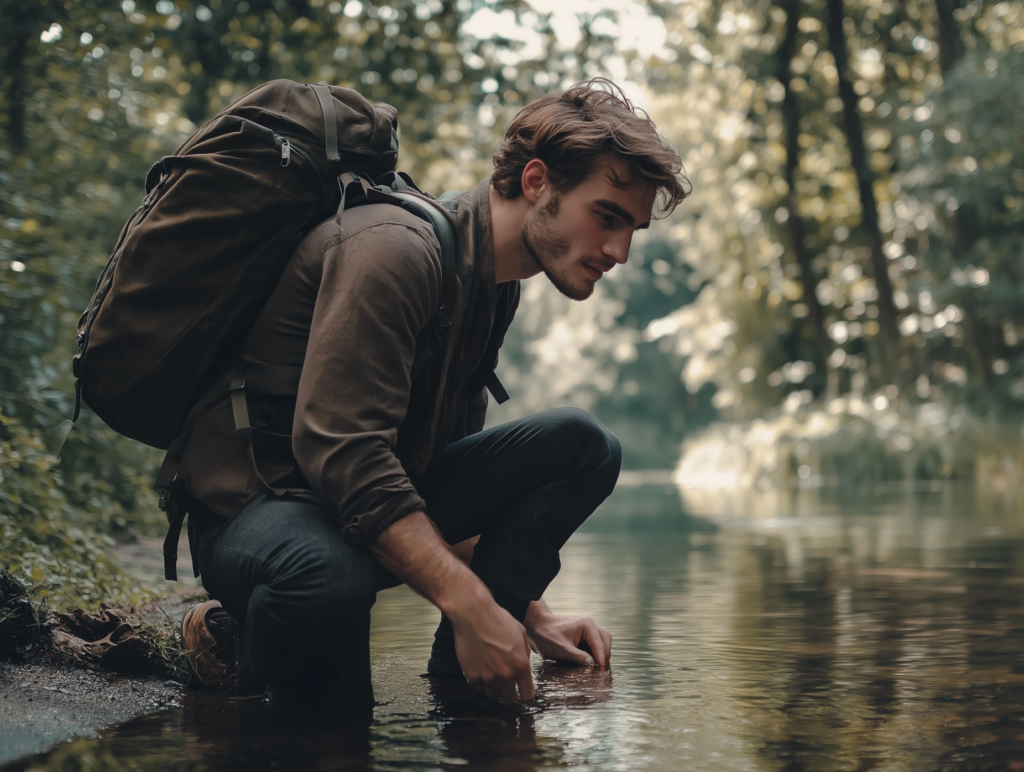
Adrian now had only one course before him. He set his pack down deliberately, the sound muffled in the damp earth. The wolf’s ears flicked forward, body quivering with tension. Adrian met its gaze, then lowered himself to his knees. His movements were slow, deliberate—offering every signal he was not there to threaten.
He pressed his palm to the ground, feeling the chill seep through his glove. There he heard a vibration, faint but undeniable. The sound of something struggling beneath the soil. His pulse surged. He reached for the spade, lifting it only inches, careful to keep his body angled away from the wolf.
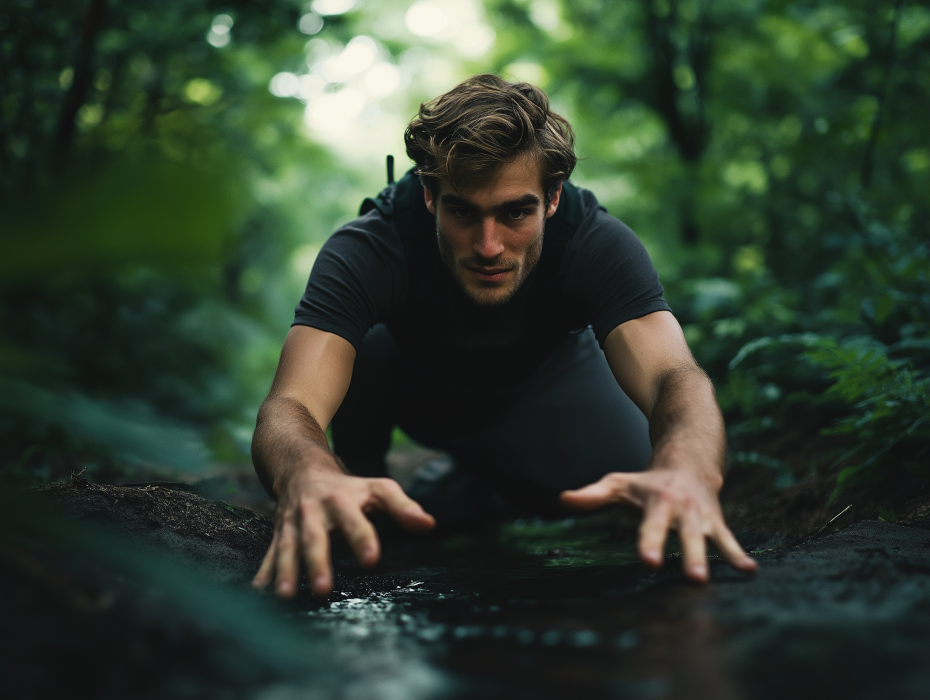
The snarl came sharp, cutting through the rush of the river. Adrian froze, heart slamming against his ribs. The wolf’s body coiled, weight shifted to its front paws, ready to spring. For an endless moment, predator and man locked eyes. Then, slowly, Adrian set the spade down again.
He raised both hands, whispering, “I’m trying to help.” The words were absurd. He was reasoning with an animal—but his voice trembled with sincerity. The wolf’s growl tapered into silence, though its teeth remained bared. A fragile stalemate. Adrian knew it would not last if he pressed his luck too far.

He tried another approach, inching sideways, circling to the opposite edge of the bank. The wolf pivoted, shoulders tense, but did not lunge. Adrian dropped to the mud again, leaning low, straining to listen. The cries came clearer here—thin, desperate, fading. He clenched his jaw. Time was vanishing.
Mud clung to his gloves as he scraped at the surface with his fingers, too afraid to wield the spade. The wolf’s hackles rose instantly, a deep rumble vibrating the air. Adrian forced himself to stop, breath shallow. The beast’s vigilance was absolute. No trespass went unnoticed.
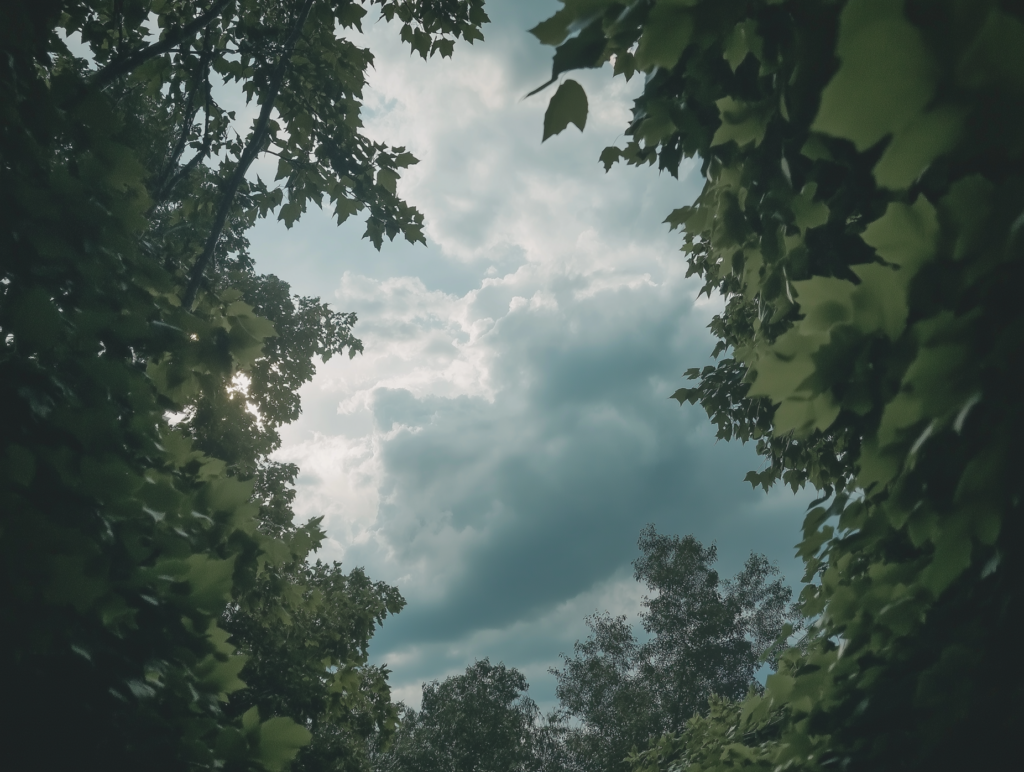
Rain clouds gathered above, dimming the light. Adrian felt the first drops sting his face, mingling with sweat. He imagined another storm swelling the river, drowning whatever lay beneath. He bit back frustration, knowing a single reckless move would turn the wolf into an executioner instead of a guardian.
For long minutes, he sat motionless, the wolf’s eyes never leaving him. His muscles ached, but he dared not shift. Then, faintly, the sound rose again—a whimper, softer than before. The urgency pressed against his ribs like a vise. He had to act, but how?
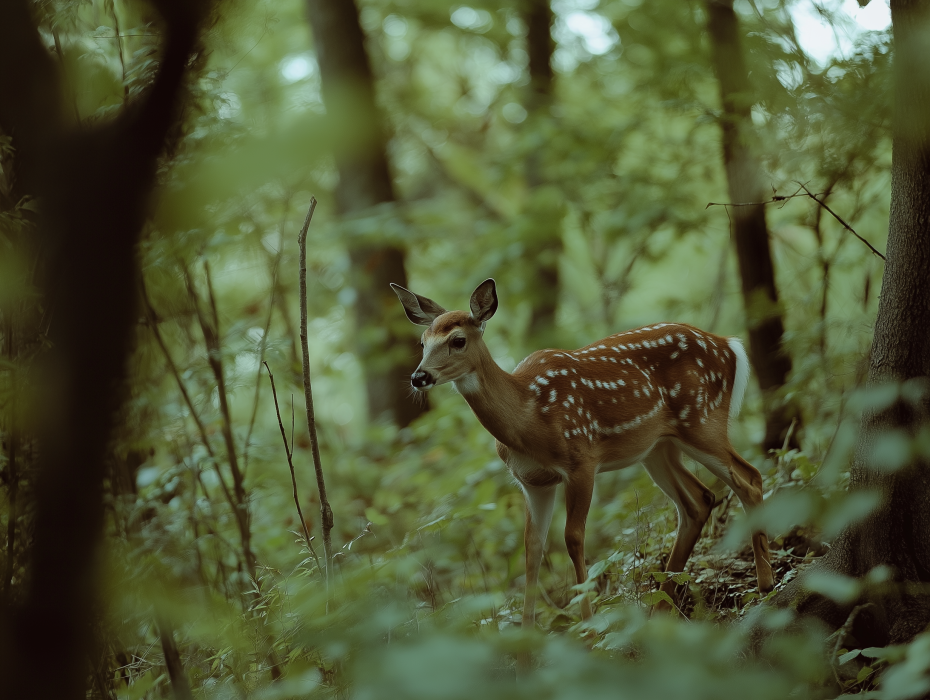
A sudden crash in the trees behind startled them both. Adrian spun, spade clattering against stone. The wolf whipped its head toward the sound, muscles taut. It was just a deer bolting through the undergrowth. But when its gaze returned to Adrian, suspicion burned brighter than ever.
Breath ragged, Adrian backed away once more, retreating to the far bank. He had learned something, though—the cries were real, unmistakable, growing weaker by the hour. Whatever secret bound the wolf there, it was alive. And unless he found a way past the beast, it would soon be gone.
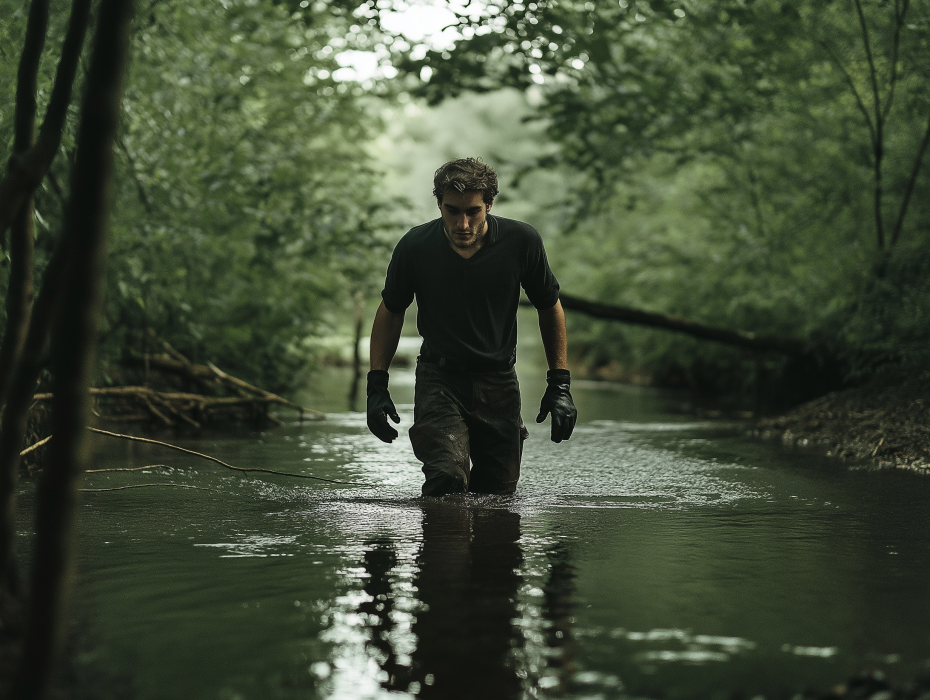
Adrian returned, exhaustion written into every line of his face. He carried nothing but his gloves this time, leaving the spade behind. He needed the wolf’s trust, or at least its tolerance. As he stepped onto the bank, the animal lifted its head, eyes dim yet unyielding.
The wolf swayed on its feet, ribs sharp beneath its hide. It had gone without food for over three days now. Adrian’s chest tightened at the thought. He crouched slowly, whispering, “Let me see. Please.” The river hissed between them like a judge deciding their fate.
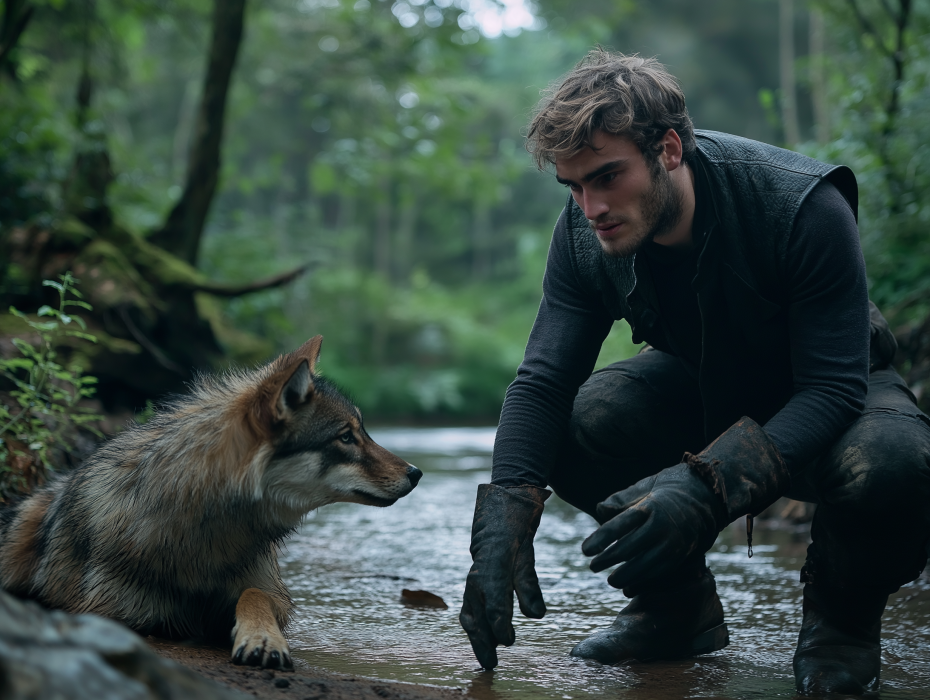
The growl came faint but determined. Adrian froze, then pressed his palm flat against the earth. The muffled cry rose again, fragile as breath. He saw the wolf’s ears twitch toward the sound, its gaze flicking back to him. For the first time, something like hesitation softened its stance.
With painstaking care, Adrian scraped at the mud with his bare hands. The wolf bristled but did not lunge. Pebbles gave way to loose soil. A thin cry pierced the air, sharper now, no longer muffled. Adrian’s pulse leapt. He worked faster, heart racing against the clock.
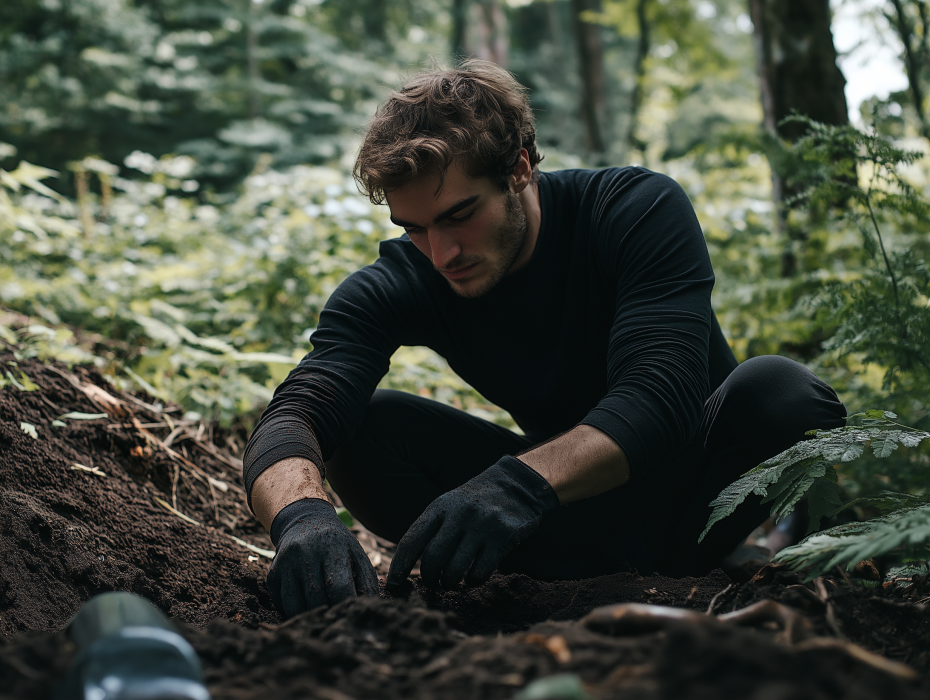
The wolf crept closer, its shadow stretching over him. Adrian kept his movements slow, deliberate, though panic threatened to choke him. Stones shifted beneath his fingers, revealing a narrow gap. From within, a tiny paw pushed forward, followed by a desperate whine that rattled his bones.
Adrian’s breath caught. It was a single bear cub, slick with mud, eyes sealed shut, trembling with fear. It had been trapped in a collapsed den, buried by shifting earth. He widened the gap carefully, sliding his hands inside to lift the fragile creature free.
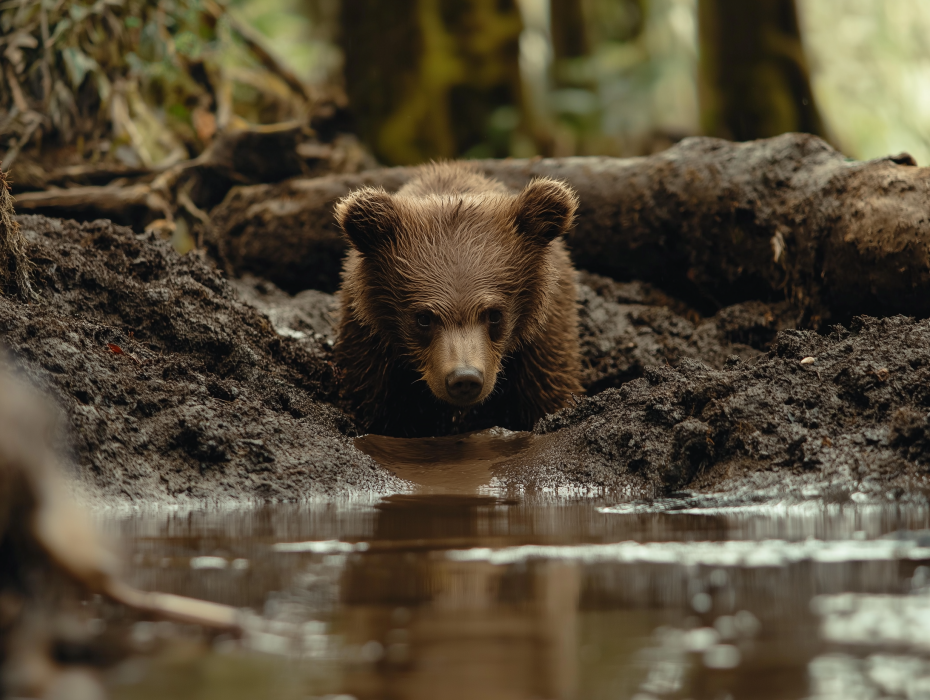
For a heartbeat, Adrian feared the wolf would strike, furious at his intrusion. But the beast only stared, eyes hollow with exhaustion and something that read like relief. Adrian set the cub gently on the bank. The wolf lowered its head, nostrils flaring, then nudged the cub closer with a trembling muzzle.
The cub whimpered, stumbling, pressing into the wolf’s chest as though she were its mother. Adrian felt his breath catch at the sight. Predator and prey were not supposed to cross these lines, yet here they were—an orphaned bear clinging to a guardian who owed it nothing.
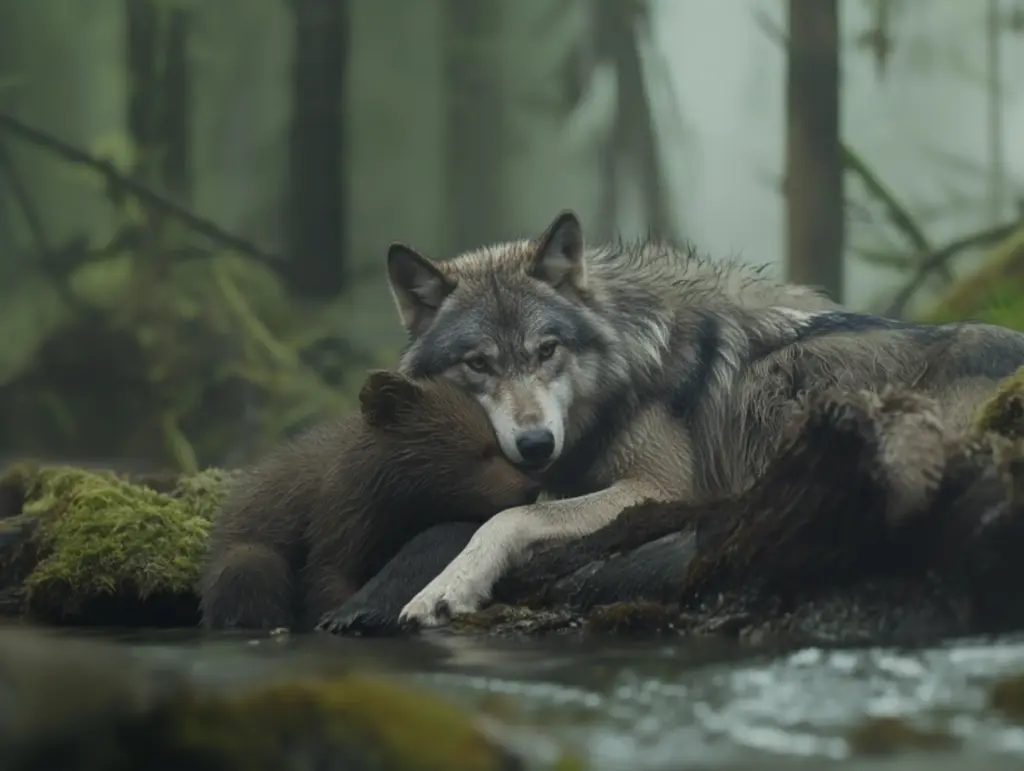
The wolf lay down heavily, curling around the cub. Her ribs still showed, her body still frail, but her vigil had ended. She had starved, suffered, and endured storms to protect another’s young. The cub nuzzled into her belly, safe at last within the warmth of her fur.
Adrian pulled out his phone, fingers shaking as he dialed for help. Minutes later, a rescue team was en route with transport cages and sedatives. By nightfall, both wolf and cub lay safely in the hospital’s care—weak but alive. Their strange bond endured under sterile lights, astonishing everyone who saw.
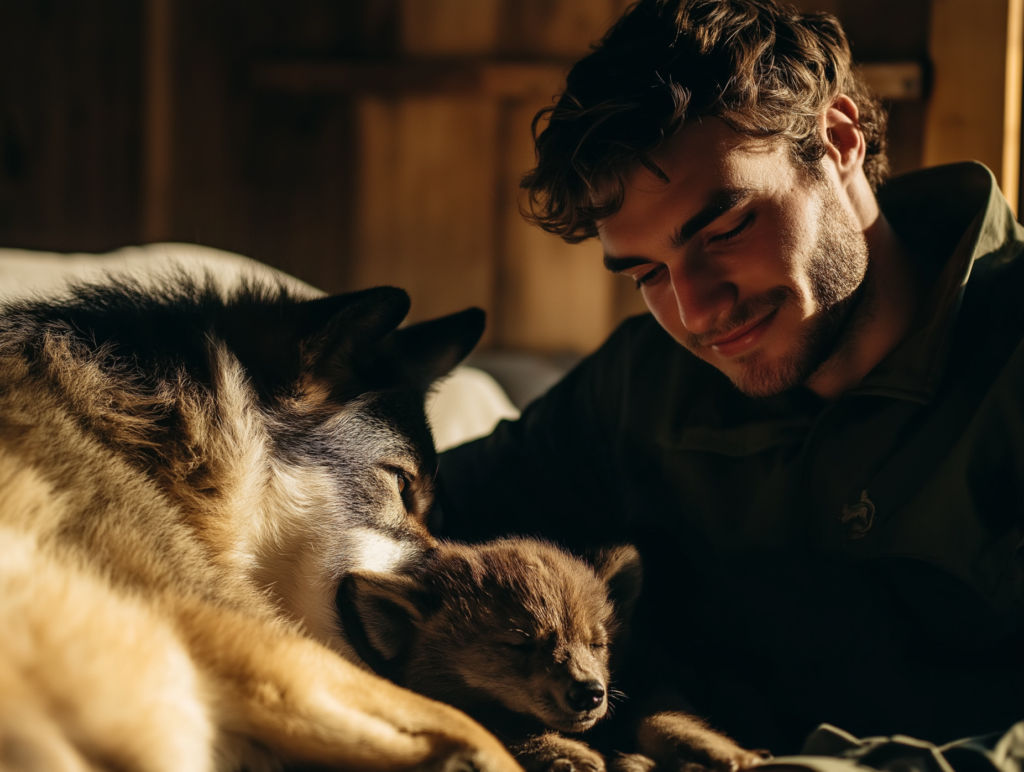
As Adrian watched the pair lying peacefully in the hospital, he couldn’t help marveling at what he saw. He knew he had witnessed something rare and sacred—proof that love in the wild could defy hunger, instinct, and even species itself.
